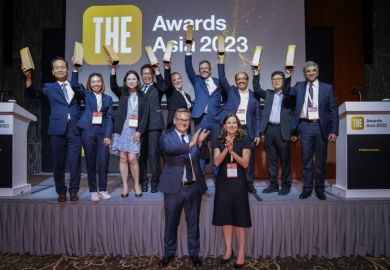In attempting to reconcile public opinions on safety measures and productivity levels, leadership in the era of Covid-19 has become even more of a politicised and polarising topic. As university leaders face deepening uncertainty over how to implement blended learning while endeavouring to mollify disgruntled students (and deter dropouts), short-term solutions that prioritise health and funding have inevitably been favoured, overriding pledges to sustainability and inclusivity. The virtual Times Higher Education Leadership & Management Summit on 3 November will illustrate how leaders can learn from their peers to create a more constructive and palatable teaching environment, and build on their reputation and student satisfaction in the process.
At the event, THE will also launch THE Campus, a platform developed with this peer-to-peer learning in mind, where a community of leaders, faculty and academic staff can share best practice in online teaching and learning.
Phil Baty, THE’s chief knowledge officer, said: “We saw outstanding and truly inspiring examples of agility, dynamism and teamwork as institutions adjusted quickly and effectively to the pandemic when it first hit, with exceptional leadership on display. But as second waves of the virus hit many countries, and the seriousness of the longer-term fallout of the crisis starts to emerge – not least profound inequalities – the great tests of leadership really begin.”
The summit, which will feature both an Ideas stage and a Collaboration stage on its online platform, will begin at 06:30 GMT. Cheryl de la Rey, vice-chancellor of the University of Canterbury in New Zealand, will deliver the opening keynote focusing on the benefits of an adaptive leadership model.
“2020 is testing the very nature of the university – its purpose and its future. As leaders we need to focus on that which matters most: asking ourselves what is our purpose, what are our guiding principles, and what actions will ensure pathways to survival and success,” said Professor de la Rey.
What the top brass of institutions have learned from the shift to online teaching and learning and how that has influenced their plans for an uncertain future will be discussed during the THE Campus panel featuring Freeman Hrabowski, president of the University of Maryland Baltimore County, and Thuy Thi Nguyen, president of Foothill College in California. This session marks the launch of THE Campus, which has been developed with Arizona State University, Cintana and Microsoft to be the definitive place for university leaders and academics to reimagine higher education.
A drop-in workshop explaining how to contribute best-practice knowledge to THE Campus as well as highlight some of the resources already available on the platform will take place at the THE booth from 12:30 to 13:15.
Meanwhile, university governance boards are still routinely criticised for their failure to interrogate the homogeny common among more senior members of faculty. Amit Chakma, president and vice-chancellor of the University of Western Australia, will be joined by Lily Kong, president of Singapore Management University, in a session offering strategies to promote diversity as a driver of progressive leadership rather than past examples of tokenism that have often exacerbated inequalities among staff.
Also, the exclusive live launch of the THE World Reputation Rankings 2020, which are created using the world’s largest invitation-only academic opinion survey, will be revealed in a masterclass conducted by Elizabeth Shepherd, managing director of consultancy services at THE. A following panel discussion including Ovidia Lim-Rajaram, chief communications officer at the National University of Singapore, and Tania Rhodes-Taylor, vice-principal of external relations at the University of Sydney, will emphasise the power of effective storytelling within university branding, an under-acknowledged but important factor in understanding what propels reputation beyond the numbers.
The final two sessions of the summit will heed two of the most pervasive and devastating by-products of Covid-19: the financial and mental health crises. Anton Muscatelli, principal and vice-chancellor of the University of Glasgow, will speak on achieving excellence through strategic financial planning in the midst of a global recession, and Santa Ono, president and vice-chancellor of the University of British Columbia, will consider what universities can do to mitigate the concerns of students that are contributing to a widespread decline in mental health.
“The crisis has shone a harsh spotlight on university leaders’ responsibilities and duties relating to their stewardship of some of the most important institutions in the world today, institutions that everyone is looking to to navigate a way out of the pandemic with effective health advice, treatments and vaccines, but also to help all of global society to adjust and recover from the profound socio-economic changes the pandemic has brought. This summit is a vital platform to share experiences, practical ideas and inspiration for current university leaders, and to help establish what is needed, in terms of attributes, diverse perspectives and structures, for the next generation of leaders,” said Mr Baty.
leah.reitman@timeshighereducation.com
Find out more and register for the virtual Leadership & Management Summit on 3 November.




